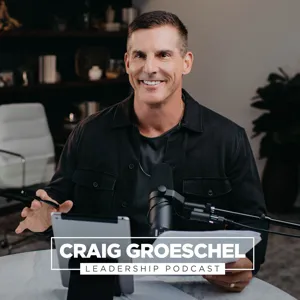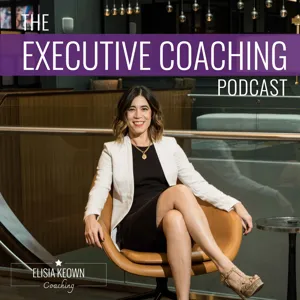Podcast Summary
Alignment through shared understanding: Lead by example, inspire alignment, and foster open communication to create a unified team, focusing on shared vision and goals.
Alignment is crucial for the success of any organization, especially as it grows and matures. In a recent consultation with a company dealing with regional sales teams, the COO was struggling to align four equal managers, each with slightly different approaches. The solution wasn't to force alignment through mandates but rather to create a shared understanding of the company's vision and goals. By fostering open communication and collaboration, the COO was able to bring the managers on board and create a more unified team. The key is to lead by example, inspire alignment, and avoid resorting to authoritarian methods. This approach not only leads to better decision-making but also fosters a more engaged and committed workforce. The discussion also emphasized the importance of accepting uncertainty and focusing on the destination rather than having a rigid plan for every step of the journey.
Leading by aligning team around shared vision: Effective leaders help team align around a shared vision, encourage open communication, and empower teams to accomplish mission in their own way.
Effective leadership involves helping team members align around a shared vision, rather than demanding their alignment. This approach fosters open communication and encourages team members to contribute their unique perspectives. It's important for leaders to clearly communicate the reasons behind desired standardizations and be open to feedback and adjustments along the way. Imposing plans on people is not an effective leadership strategy. Instead, leaders should empower their teams to figure out how to accomplish the mission in their own way. This decentralized command approach starts in the planning phase and can lead to better outcomes and increased engagement.
Listen to team members' perspectives and work collaboratively: Leaders should embrace resistance and work together with team members to find solutions that address everyone's needs
As a leader, it's unrealistic to expect that every standard operating procedure will be perfect the first time around. Trying to impose such procedures on team members who may have valid concerns or objections can lead to wasted leadership capital, frustration, and potential conflict. Instead, it's crucial to listen to team members' perspectives and work collaboratively to find solutions that address everyone's needs. Alignment is not always the root cause of problems; often, it's a matter of addressing specific agendas or concerns. By embracing resistance and working together to find common ground, leaders can build stronger, more effective teams.
Welcoming team member's perspectives and pushback: Effective leaders listen and embrace team member's opinions to prevent mistakes, demonstrate trust, and improve plans for success.
Effective leadership involves actively listening to and embracing the perspectives and pushback of team members. This not only helps prevent potential mistakes and misalignments, but also demonstrates trust and respect for the team. As Jocko Willink emphasizes, the mindset of welcoming pushback can lead to improved plans and ultimately, success. It's important for leaders to remember that their own ego should not hinder the team's progress, and that listening and considering different viewpoints can prevent a caution or warning situation from arising. The LDAP program, as an example, highlights the importance of this approach, as it encourages open communication and collaboration among team members.
Teaching clients to fish instead of giving them fish: Echelon Front's long-term leadership development programs aim to make them self-sustaining, allowing clients to continue the process internally without consultancy involvement. Virtual interaction increases efficiency and effectiveness, and certification programs allow scalability and cost-effectiveness.
At Echelon Front, the goal of their long-term leadership development programs, such as LDAP, is not to keep clients reliant on their consultancy indefinitely. Instead, they aim to make these programs self-sustaining, allowing the organizations to continue the leadership development process internally without their involvement. This approach is unique in the industry as most consultancies aim to keep clients dependent on their services. The shift to virtual interaction has increased the efficiency and effectiveness of these programs, allowing for more interaction and repetition, which is crucial for developing leadership skills. For larger organizations, Echelon Front introduced a certification program to introduce the concepts to lower levels of the organization without disrupting their work. This certification program is part of their online resource, allowing for scalability and cost-effectiveness. In essence, their goal is to teach clients to fish, rather than giving them fish.
Leadership development essential at all levels: Provide opportunities for exposure and repetition in normal work cycle, self-paced certification programs, align top and bottom, frontline employees impact strategic objectives, ensure individual contributions align with larger team and strategic goals
Effective leadership development is essential at every level within an organization, from the executive team to frontline employees. The principles, mindset, and skills required for leadership are the same at every level. It's crucial to provide opportunities for exposure and repetition in a way that fits within the normal work cycle, rather than demanding time away. A self-paced certification program can be an effective solution. The alignment between the top and bottom of an organization is crucial, and frontline employees have the ability to impact strategic objectives, so developing them is essential to achieving organization-wide alignment. As organizations grow and expand, pushing alignment down to the lowest levels remains a fundamental challenge. The goal is to ensure that everyone in the organization understands how their individual contributions contribute to the larger team and the overall strategic objectives.
Aligning thinking for effective decentralized command: Effective communication and shared understanding of leadership concepts are crucial for successful decentralized command. Misalignment in leadership methodologies can lead to problems, even with physical alignment. Focusing on both mission alignment and alignment in thinking can help facilitate effective communication and accelerate progress.
Effective communication and alignment in thinking are crucial for successful decentralized command. While ensuring that every team member understands the mission, goal, and commander's intent are essential, it's equally important for leaders to align their thought processes. Misalignment in leadership methodologies can lead to significant problems, even if the physical alignment is perfect. Using a common language and understanding of leadership concepts can facilitate effective communication and accelerate progress. At Echelon Front, we focus on both mission alignment and alignment in thinking to help our clients communicate and lead more effectively.
Leading larger teams requires different skills: Effective leadership changes as team size grows, focusing on building unified goals, making roles and responsibilities, and fostering relationships between teams
Effective leadership changes as the team size grows. When leading a small team, a leader can physically impose their will and make things happen. However, when leading a larger team, a leader must rely on good leadership principles such as building unified goals, making roles and responsibilities, and fostering relationships. It's not about the leader having a relationship with every team member, but also about building relationships between different teams. This requires more effort and better leadership skills. Keeping things simple is crucial, but it becomes more challenging as the team size increases. Ultimately, leadership is about covering and moving as a team, and it becomes increasingly important to build cohesive teams that can work together towards common goals.
From leading a small team to managing multiple priorities: Effective leadership involves prioritizing, executing, and adapting as the team and organization grow, emphasizing trust, communication, and shared language.
Effective leadership requires prioritizing and executing, becoming better at it as the scale and complexity of the organization grows. Initially, a leader may only have one or a few priorities, but as the team size increases, managing multiple priorities becomes essential. Decentralized command is crucial for small teams, but as the organization grows, trust, communication, and a shared language of leadership become vital. The principles of leadership remain constant, but the leader must adapt and improve. Frontline employees do not need to understand the grand strategy but should share the common language of leadership to make connections and stay engaged. The transition from leading a small team to a larger one is significant and requires quick adaptation.
Effective communication and shared understanding are crucial for successful leadership: Leadership is not just about actions, but also a way of thinking. Effective communication and shared understanding help teams learn and improve quickly as leadership becomes more significant at higher levels.
Effective communication and a shared understanding of principles are crucial for successful leadership, especially when scaling up. This common language allows teams to learn and improve quickly, as the impact of leadership becomes more significant at higher levels. As Dave mentioned, leadership is not just about actions, but also a way of thinking. This concept was emphasized during his time at National Lampard, where he witnessed powerful moments that helped others understand their roles. For those interested in delving deeper into leadership, Echelon Front offers solutions and guidance through their online courses and books, including "Extreme Ownership," "The Dichotomy of Leadership," and "Leadership Strategy and Tactics." To support their podcasts, listeners can visit jockostore.com, originmain.com, or jockofuel.com. So, go ahead and lead with clarity and purpose.




